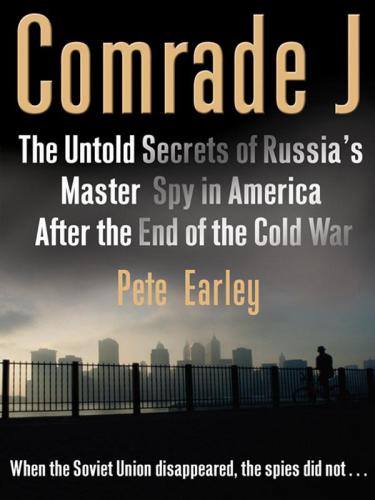
Comrade J
The Untold Secrets of Russia's Master Spy in America After the End of the Cold War
- اطلاعات
- نقد و بررسی
- دیدگاه کاربران
نقد و بررسی

October 1, 2007
Former journalist and bestselling author Earley (Family of Spies
) tells the story of Russian spymaster and defector Sergei Tretyakov—code-named Comrade J—in an exposé with few surprises. A career intelligence officer, Tretyakov was Russia's deputy resident in New York City from 1995 to 2000, responsible for all covert operations there. But as the political and economic situation in Russia deteriorated under presidents Boris Yeltsin and Vladimir Putin, Tretyakov began to consider defecting. Disgusted by the spy agency's shoddy standards and the “corrupt political system” in Moscow and seeking “a better future” for his teenage daughter Ksenia, Tretyakov became a double agent for the FBI before finally defecting in 2000. He claims that he is now breaking his silence because he hopes to warn America that Russia is not a friend and “is trying to destroy the U.S. even today.” Among his more controversial assertions, in 126 hours of interviews with the author, is that former deputy secretary of state Strobe Talbott was considered a “Special Unofficial Contact” by Russian intelligence—a claim that Talbott adamantly denies. While many of Tretyakov's claims are impossible to verify, Earley mounts a spirited defense of his veracity in this workmanlike account.

January 15, 2008
Spies exist because governments exist and governments have secrets. We may naively believe that the ending of the Cold War meant that the United States and Russia no longer spied on each other. Earley's new book on the remarkable career of top Soviet spy, Sergie Tretyakov, should dispel any thoughts that the "new" Russia under Yeltsin and now Putin is really any different from the one that existed under Stalin, Khrushchev, or their successors. Earley ("Confessions of a Spy: The Real Story of Aldrich Ames"), a former journalist who has written both fiction and nonfiction about the postCold War world, was contacted by the FBI and CIA to meet Tretyakov in 2001, soon after he had defected to the United States. This is Tretyakov's story as told to Earley, who admits that he has very little evidence to corroborate Tretyakov's tale. News accounts and interviews (off the record, of course) do seem to offer supporting evidence that much of Tretyakov's story is true. This is a fascinating account of Tretyakov's activities first as a Soviet spy in New York in the 1980s and early 1990s and then as a double agent providing extensive information to the CIA and the FBI during the Clinton presidency. Earley has solid credentials as a former "Washington Post" writer, which lends credence to this amazing story. For larger collections.Ed Goedeken, Iowa State Univ. Lib., Ames
Copyright 2008 Library Journal, LLC Used with permission.

November 15, 2007
Russian intelligence officer Sergei Tretyakov, whodefected to the U.S. in 2000, asked espionage author Earleyto write his life story. Earley recounts the reliable Communists youthful recruitmentby the KGB in the 1970s. Tretyakov handled spies in Ottawa and New York City during the 1990s forthe foreign intelligence branch, whose post-Communist acronym isSVR. Those he fingers as SVR sources, some anonymously, some by name, sensationally including Strobe Talbott, deputy of statein the Clinton administration, are this books main revelations. Earley prints Talbotts denial and also asked for confirmation from other subjectsof Tretyakovs charges, but he otherwise functions as Tretyakovs conduit about his career. Alongside divulgences about spycraft, always a draw in the true-spy genre, Tretyakov names a Canadian politician and various UN ambassadors and bureaucrats as SVR agents. Dramatizing Tretyakovs defection (motivated by disgust with corruption in Russia) and closing with an anonymous U.S. intelligence officials praise for Tretyakov as a U.S. double-agent, Earley delivers the spy-versus-spy frisson that espionage readers expect.(Reprinted with permission of Booklist, copyright 2007, American Library Association.)




دیدگاه کاربران